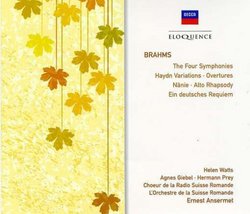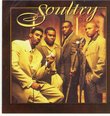| All Artists: Brahms, Watts, Osr, Ansermet Title: Brahms: Sym No 1 -4/German Requiem (Box) Members Wishing: 0 Total Copies: 0 Label: Eloquence Release Date: 5/24/2008 Album Type: Import Genre: Classical Style: Number of Discs: 4 SwapaCD Credits: 4 UPC: 028948004485 |
Search - Brahms, Watts, Osr :: Brahms: Sym No 1 -4/German Requiem (Box)
 | Brahms, Watts, Osr Brahms: Sym No 1 -4/German Requiem (Box) Genre: Classical ARTISTS Helen Watts, contralto |
Larger Image |
CD DetailsSynopsis
Album Description ARTISTS Helen Watts, contralto Similar CDs
|
CD ReviewsBalletic Brahms from Ansermet Johannes Climacus | Beverly, Massachusetts | 03/18/2009 (5 out of 5 stars) "Ernest Ansermet was a noted ballet conductor (among his many accomplishments), and this may account for his remarkable success in Brahms. Overindulgence in legato phrasing, heavy string-dominated textures, and Wagnerian pomposity can turn these classically-oriented scores into thick late-romantic sludge. After a serious binge of sumptuous indulgence via Karajan or Walter (and who doesn't enjoy a good binge now and again?) Ansermet's approach to Brahms is sure to cleanse the palate. Light textures, lifted rhythms, and (overall) brisk tempos predominate in this unconventional but entirely enjoyable Brahms cycle. This balletic approach works especially well in the First and Fourth symphonies, the two Overtures and the Haydn Variations, all of which receive vibrant and propulsive readings under Ansermet. Surprisingly, Ansermet does somewhat less well by the Second and Third Symphonies: the latter fails to convey majesty in the first and fourth movements and is insufficiently atmospheric in the second and third; the former charms in the lyrical episodes of I and III, but offers a relatively prosaic II and less than swaggering IV. I also noticed a lack of really hushed playing in all of the softer passages, particularly in slow movements. Despite these misgivings, Ansermet provides a refreshing and frequently exciting traversal of the four symphonies. Nothing is taken for granted; nothing sounds stale or hackneyed--and with such familiar repertoire, that is a great advantage. Don't look for the ultimate in orchestral refinement from the SRO, though this much-maligned ensemble are generally on their best behavior here. This inexpensive box also very generously includes three vocal works: The omnipresent *German Requiem* and Alto Rhapsody, as well as the underappreciated *Nänie.* All three get first-rate performances. Helen Watts sings exquisitely, and with a salutary reserve, in the Rhapsody. Ansermet conveys just the right balance of melancholy and rapture in *Nänie*--one of Brahms's most gorgeous works. I have heard more fulsome and also more earth-shattering renditions of the *German Requiem* than Ansermet's, though his cool-headed and clear-textured approach brings out the work's Baroque inheritance rather well. Another advantage is the articulate and beautifully balanced contribution from a choir of more modest size than one usually encounters in this work. The dedicated artistry of the two soloists, Giebel and Prey, cannot be too highly praised; they decline any temptation exploit their solos as opportunities for self-promotion. As usual with Decca's recordings of this period, the sound conveys a near-perfect balance of vivid realism and ambient warmth. The tendency of many early-digital remasterings toward dryness (particularly in respect to string sonorities) has long since been overcome: the engineers have ensured that these venerable recordings sound newly minted. All praise, then, to the enterprising Decca/Eloquence label (an Australian subsidiary of Universal) for reviving Ansermet's superb Brahms cycle, even though in a perfect world text and translations for the vocal works would have been included. I frankly never believed that these recordings would resurface on CD, but here they are. Tolle, Audite!" Treasurable performances revealed again Corno di Bass Trombono | Florida, U.S.A. | 02/02/2009 (5 out of 5 stars) "Thanks to the Australian Eloquence label we have an opportunity to revisit these performances from the golden age of long-playing records. The Symphonies and orchestral music stand up very well to anything subsequently published. The German Requiem, perhaps somewhat less so, although it is a most beautiful performance. Without revealing too much, I would place the Symphonies among the top three collective perfomances available. A few (very few) audio blips might be due to a defect in the audio tapes. If so, it's a small matter of little concern. If not, perhaps I should have returned the set for replacement. I suspect copy two would have revealed the same glitches. For all Brahms lovers, this is a must." Maybe the best all-around Brahms cycle Joey Joe Joe Jr. Shabadoo | Boston, MA USA | 11/20/2009 (5 out of 5 stars) "What is it about ballet conductors and Brahms? It seems as though some of the greatest Brahms cycles were performed with men at the podium who were more widely acclaimed for their interpretations of dance suites like Tchaikovsky's Swan Lake than in the standard warhorse repertoire. Antal Dorati is another such conductor who immediately comes to mind, whose Brahms Cycle contains some of the very finest stereo recordings of the 3rd and 4th. In many ways, Ansermet's cycle displays the same virtues as that wonderful set: brisk tempi, great clarity, relatively light textures, an emphasis on rhythmic drive and perfectly crafted architectonics. This approach works particularly well in Symphonies 1, 3 and 4, although the finale of the 3rd could be a bit more aggressive, especially at the climaxes. That said, 1 & 4 are end-to-end exceptional, and in my opinion Ansermet's 4th is one of the very best stereo accounts of this dark masterpiece, up there with Schuricht, van Beinum, Reiner, Kleiber and Dorati, with the 1st not far behind. The only real misfire in the set is #2, the warmest of Brahms' Symphonies, where maybe some more space and breadth would have helped convey the emotions Brahms looked to impart. Additionally, the finale of the 2nd to my ears lacks the necessary momentum this neo-Beethovenian movement calls for. For this work, Karajan's 1963 DGG recording is still the one to beat in my eyes, with Monteux also worth consideration. Sometimes, I'd like a slightly softer approach in the slow movements across the entire cycle, but Ansermet's idiomatic approach can be a double-edged sword and I'm willing to live with it, especially since these very qualities help hold together the massive, difficult Brahms allegros. Many of these same qualities apply to the overtures, which are executed well across the board, as are "Nanie" and especially the Alt-Rhapsodie, which is a splendid recording that may be my favorite.
I find Ansermet's approach works less well in Ein Deutsches Requiem, which I believe could use a bit more grandeur than we're given here. Still, it's a very unique recording: classical, lean and unindulgent. I prefer a more monolithic approach in this work, such as Klemperer's famous EMI recording; still this version is an excellent change of pace from the more opulent renditions which by and large seem to be the norm. The performers here, L'Orchestre de la Suisse Romande, certainly will never be confused with the Berlin Philharmonic or Staatskapelle Dresden, but they are very committed to these readings and respond very well to Ansermet's direction. While there are a few moments of less than perfect ensemble work and a few sour notes from the wind section here and there, it never detracts from the listening experience, especially with interpretations as fine as these from Maestro Ansermet. The sound is really amazing when you consider these were recorded in the early 1960s. Well-balanced, full-bodied, and with a surprising amount of dynamic range at both the low-end and high-end. You can really here everything in fine detail, from the woodwinds to the brass to the kettle drums and double-basses. This is excellent, excellent vintage analog, which was something of a hallmark of Decca's recordings from this time period. Liner notes are OK, if not great. Sort of a "beginners guide" to Brahms' symphonies in my opinion, and more focused specifically on Ansermet's performance. I could have done with some better, more insightful notes, but it's a minor critique really. This really is a great Brahms set. If you're familiar with the thicker, denser Brahms of Ormandy, Karajan or Giulini, this set will come as a bit of a shock, but it serves as a very different yet equally valid viewpoint, and an approach which I believe illuminates Brahms' complex musical language more completely and honestly than most other versions I've heard. Very high recommendation. If you enjoy his approach with this cycle, I would also recommend that you look into his Beethoven cycle, which is of a similar interpretive bent, and is available across 3 different Eloquence double-disc releases: Beethoven: Sym Nos 1-4/Coriolan Overture Beethoven: Sym Nos 5-8/Egmont Overture Beethoven: Sym No 9/Overtures Happy Listening!" |




